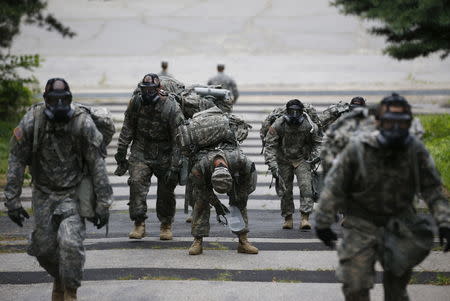South Korea pushes back at Trump claims about more money for troop agreement
By Hyonhee Shin and Josh Smith SEOUL (Reuters) - South Korea's presidential Blue House pushed back on Wednesday against comments by U.S. President Donald Trump that suggested Seoul had agreed to pay $500 million more toward maintaining U.S. troops in the country. Trump said at a cabinet meeting in Washington on Tuesday Seoul had agreed to pay $500 million more as part of an agreement sharing the cost of keeping roughly 28,500 American troops stationed in South Korea. "They were paying about $500 million for $5 billion worth of protection," Trump said. "And we have to do better than that. So they've agreed to pay $500 million more." Under the previous agreement - which lapsed amid disagreements in December - South Korea contributed 960 billion won ($857 million) in 2018. South Korean and American officials initialed an agreement on Sunday under which Seoul would increase its contribution to just under 1.04 trillion won ($927 million), an increase of about $70.3 million. Kim Eui-kyeom, a spokesman for the presidential Blue House in Seoul, said when asked about Trump's $500 million figure that it "shouldn't be taken as a fait accompli". Washington demanded during the negotiations that South Korea pay 50 percent more than its 2018 contribution, according to South Korean officials. The new agreement amounts to an increase of about 8 percent. The agreement signed on Sunday must still be approved by South Korea's parliament. Kim said it was valid for only one year, with the possibility of an extension for another year if both sides agreed. "Both sides will consider whether a raise is needed and it's also possible that they would agree to maintain the current level," Kim said. The two sides had struggled to reach a breakthrough, despite at least 10 rounds of talks since March, amid Trump's repeated calls for a sharp increase in South Korea's contribution. Trump said in his cabinet comments on Tuesday the relationship with South Korea was "great" but that the United States lost "a tremendous amount of money" defending its ally. (Reporting by Hyonhee Shin and Josh Smith; Editing by Paul Tait)


